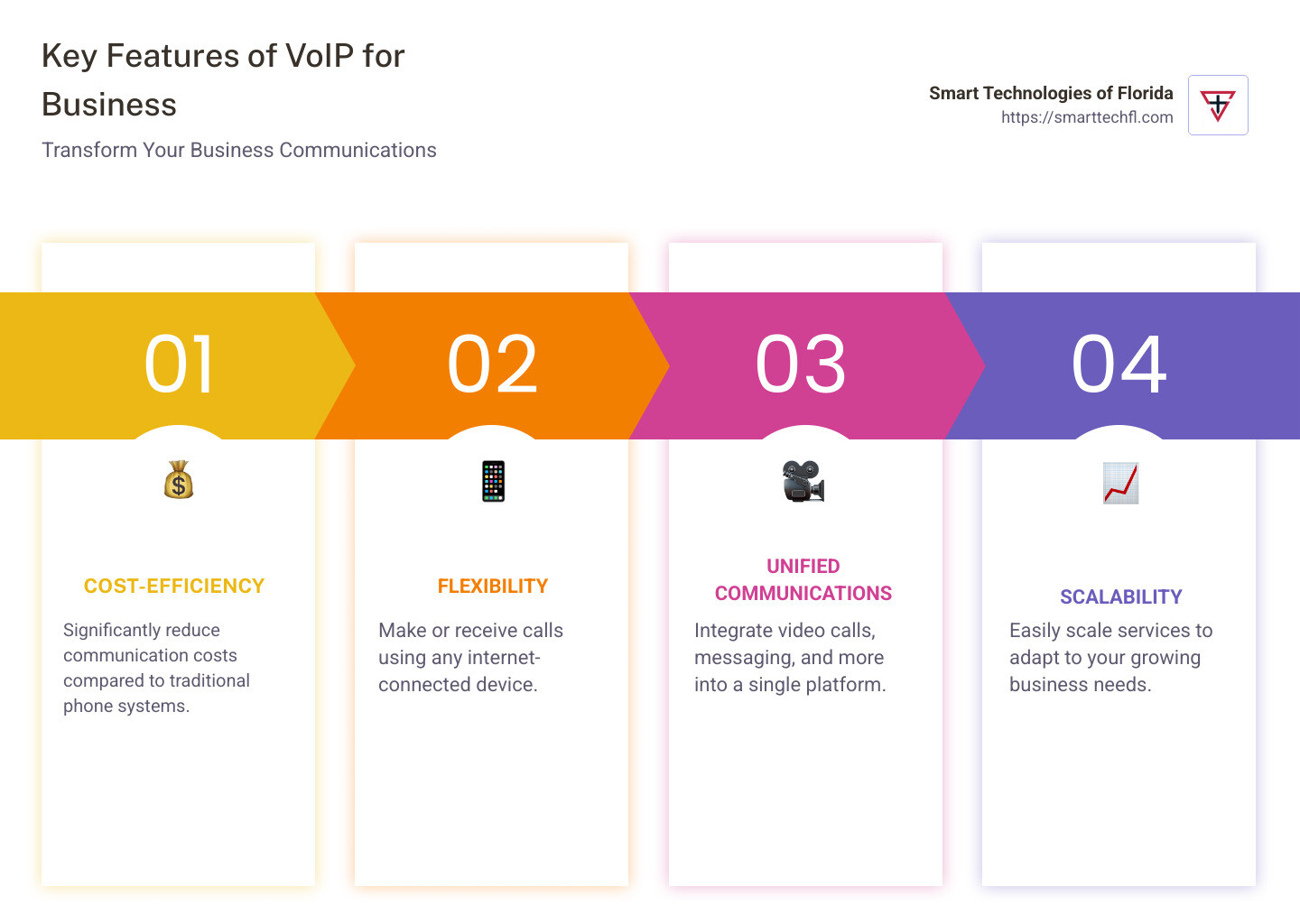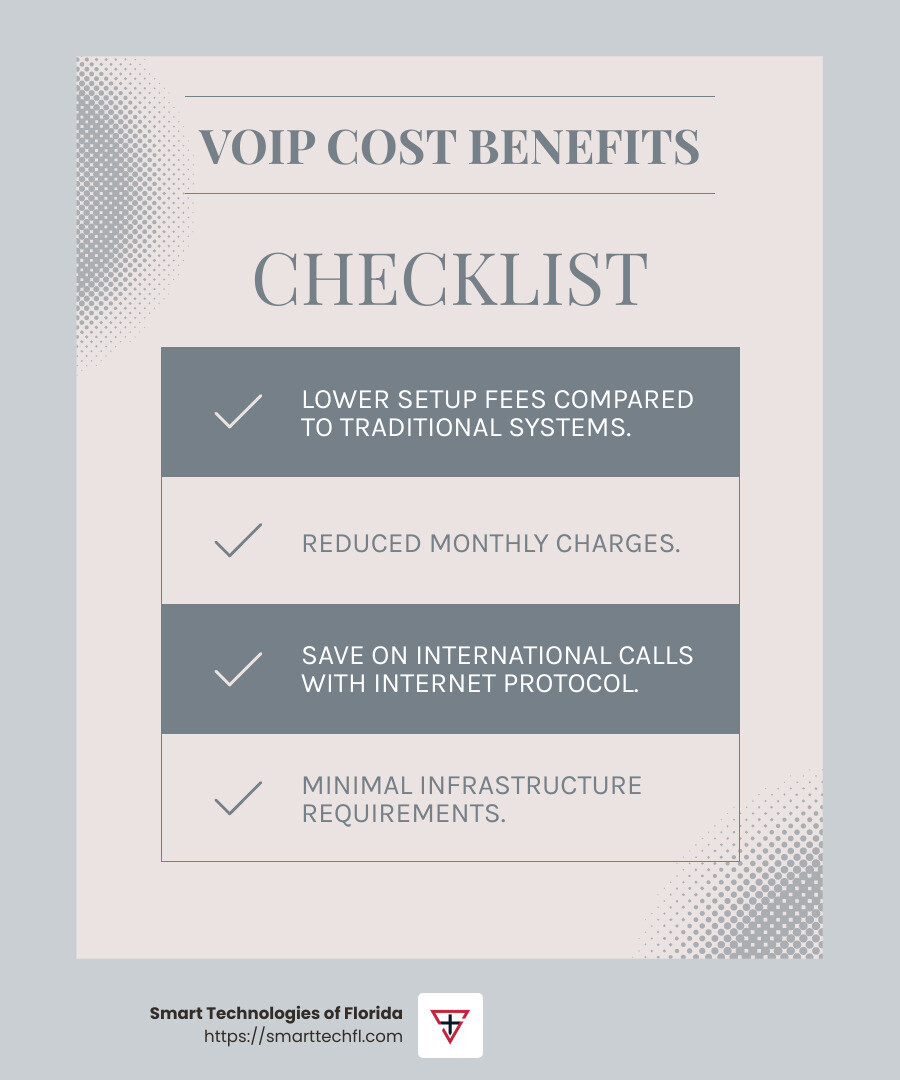VoIP Unveiled: Essential Features for Business Success
In the modern digital era, small and mid-sized businesses are exploring innovative ways to enhance communication and optimize operations. Enter VoIP business Solutions, a technology transforming how companies connect internally and with customers.
Here’s why VoIP business is a game-changer:
- Cost-Efficiency: Reduce communication costs compared to traditional phone systems.
- Flexibility: Make or receive calls from any device with internet access.
- Unified Communications: Integrates video calls, messaging, and more in one platform.
- Scalability: Easily adjust services to fit your growing business needs.
- Advanced Features: AI, 5G, and more for superior call quality and customer engagement.
As businesses like Smart Technologies of Florida in Daytona Beach evolve, adopting VoIP systems can be crucial for overcoming challenges with outdated technology and high operational expenses. VoIP provides a modern solution by offering seamless, quality communication tools that cater to the demands of a digital change journey.
Get ready to dig into how this technology can boost customer engagement, empower your staff, and help your business thrive in the digital age.

Understanding VoIP Business Solutions
VoIP, or Voice over Internet Protocol, is a technology that revolutionizes how businesses make and receive phone calls. Unlike traditional phone systems that rely on copper wires, VoIP uses the internet to transmit voice data. This shift to digital calling offers several advantages, especially for small and mid-sized businesses.
What is Digital Calling?
Digital calling with VoIP means your voice is converted into data packets and sent over the internet. This process allows for more flexibility and features than traditional phone lines. You can make calls from any device that has an internet connection—be it a smartphone, tablet, or computer. This flexibility is perfect for businesses with remote teams or those looking to improve mobility.
Cost-Saving Benefits
One of the most compelling reasons to switch to VoIP is cost savings. Traditional phone systems often come with hefty bills due to long-distance charges and maintenance fees. However, VoIP business systems typically offer lower monthly rates, as they eliminate the need for separate phone lines.
According to research, most small businesses can expect to pay about $20 per user per month. This is a significant saving compared to traditional systems, where costs can quickly add up. Additionally, VoIP providers often offer tiered pricing based on the features you need, so you only pay for what you use.
Unified Communications
VoIP isn’t just about voice calls. It’s part of a broader trend towards unified communications, which integrates various communication tools into one platform. This includes video conferencing, instant messaging, and even social media interactions. By consolidating these tools, VoIP helps businesses streamline their operations and improve collaboration.
Scalability for Growing Businesses
As your business grows, so too can your VoIP system. Adding new users or features is often as simple as updating your subscription plan. This scalability makes VoIP an ideal choice for businesses that anticipate growth or fluctuating communication needs.
In conclusion, VoIP business technology is more than just a modern alternative to traditional phone systems. It’s a comprehensive communication solution that offers flexibility, cost savings, and advanced features to help businesses thrive in a digital age. Understanding how to leverage these benefits will be key to business success.
Essential Features of VoIP for Business Success
When it comes to VoIP business solutions, certain features are crucial for ensuring business success. Let’s explore these essential features: unified communications, scalability, AI integration, and omnichannel support.
Unified Communications
Unified communications is a game-changer. It brings all your communication tools—voice, video, messaging, and more—into a single platform. This integration allows employees to collaborate seamlessly, whether they’re in the office or working remotely. Imagine a team meeting where some members are in the office, others are working from home, and a few are on the road. With unified communications, everyone can join a video call, share files, and chat in real-time, all from one interface.
Scalability for Growing Businesses
A scalable VoIP system is essential for businesses that plan to grow. As your team expands, adding new users or features should be straightforward. Many VoIP providers offer flexible plans that allow you to scale up or down based on your current needs. This means you can start with a basic plan and add more advanced features as your business demands evolve. Scalability ensures your VoIP solution grows with you, preventing the need for frequent overhauls.
AI Integration
Artificial intelligence (AI) is becoming a vital part of modern VoIP business systems. AI can automate routine tasks, provide call summaries, and even analyze sentiment during calls. For example, AI-powered sentiment analysis can help your customer service team understand caller emotions, leading to better customer interactions. AI also aids in transcription and real-time translation, making global communication more efficient and accessible.
Omnichannel Support
Today’s businesses need to communicate with customers across multiple channels. Omnichannel support in VoIP systems allows you to manage voice calls, video meetings, emails, and social media interactions from one platform. This feature ensures consistent communication and helps maintain a unified brand voice across all channels. By centralizing customer interactions, businesses can provide a smoother, more cohesive customer experience.
Incorporating these features into your VoIP system can significantly improve your business operations. Whether it’s improving team collaboration through unified communications or leveraging AI for smarter interactions, these features are key to open uping the full potential of your VoIP solution.
Next, let’s explore the benefits of implementing VoIP in your business.
Benefits of Implementing VoIP in Your Business
Switching to a VoIP business system offers a range of benefits that can transform how your company operates. Let’s break down some of the key advantages: cost-effectiveness, flexibility, improved collaboration, and improved customer engagement.
Cost-Effectiveness
One of the most compelling reasons to adopt VoIP is its cost-saving potential. Traditional landline systems can be expensive, with high setup fees and ongoing maintenance costs. In contrast, VoIP business solutions typically have lower monthly fees and fewer infrastructure requirements. Businesses can also save on international calls, as VoIP uses the internet to connect calls, often at a fraction of the cost of landline services.

Flexibility
VoIP systems offer best flexibility. Employees can make and receive calls from anywhere with an internet connection, using various devices like smartphones, laptops, and tablets. This flexibility supports remote work and allows your team to stay connected, whether they’re in Daytona Beach, FL, or halfway across the world. Additionally, VoIP systems can easily adapt to your business’s changing needs, whether you’re scaling up or down.
Improved Collaboration
With features like video conferencing, instant messaging, and file sharing, VoIP improves team collaboration. Unified communications allow employees to work together seamlessly, regardless of their location. Imagine being able to share a document during a call or quickly message a colleague without switching platforms. This streamlined communication fosters a more productive and cohesive work environment.
Improved Customer Engagement
A VoIP business system can significantly improve how you engage with your customers. Omnichannel support means you can handle calls, emails, and social media interactions from a single platform. This centralization ensures consistent communication and a unified brand voice. Moreover, features like AI-powered sentiment analysis and call recording provide valuable insights into customer interactions, helping you tailor your services and improve customer satisfaction.
Implementing a VoIP system not only cuts costs but also improves your business’s agility, collaboration, and customer relationships. By embracing these benefits, your business can thrive in today’s digital landscape.
Next, we’ll guide you through choosing the right VoIP system for your needs.
How to Choose the Right VoIP System
Choosing the right VoIP business system can feel overwhelming, but focusing on a few key areas can simplify the process. Let’s explore the essentials: internet requirements, budget considerations, and feature needs.
Internet Requirements
To run a VoIP business system smoothly, you need a reliable internet connection. VoIP transmits voice data over the internet, so a stable connection is crucial for clear calls and minimal disruptions.
- Bandwidth: Ensure your internet plan offers enough bandwidth to handle VoIP traffic. As VoIP is sensitive to network quality, insufficient bandwidth can lead to dropped calls or poor audio quality.
- Connection Type: Fiber-optic and high-speed broadband connections are ideal. If your business is in a location like Daytona Beach, FL, check with local providers for the best options.
- Network Setup: Consider upgrading your network infrastructure, such as routers and switches, to support VoIP. A well-optimized network minimizes latency and jitter, ensuring smooth communication.
Budget Considerations
VoIP systems can save your business money, but budget wisely.
- Pricing Plans: VoIP services typically offer subscription-based pricing. Evaluate plans based on the number of users and features you need. Prices can range from $15 to $65 per user per month.
- Hidden Costs: Be aware of potential hidden costs, such as setup fees, hardware purchases, or additional support services. Some providers offer discounts for annual payments, which can reduce overall costs.
- Scalability: Choose a system that can grow with your business. A scalable VoIP solution allows you to add or remove users easily, ensuring you only pay for what you need.
Feature Needs
Identify the features that will best support your business operations.
- Unified Communications: Look for systems that integrate voice, video, and messaging into one platform. This integration improves collaboration and streamlines communication.
- Omnichannel Support: If customer engagement is a priority, choose a VoIP system that offers omnichannel support. This feature allows you to manage calls, emails, and social media interactions from a single platform.
- AI Integration: Advanced features like AI-powered analytics can provide insights into customer interactions, helping you improve service and satisfaction.
By focusing on these areas, you’ll be well-equipped to choose a VoIP system that meets your business’s needs and sets you up for success. Next, we’ll address some frequently asked questions about VoIP business systems.
Frequently Asked Questions about VoIP Business
What is a VoIP business?
A VoIP business revolves around using Voice over Internet Protocol (VoIP) technology for digital calling. Unlike traditional phone systems, VoIP converts voice into digital signals and transmits them over the internet. This allows businesses to make calls from any device with an internet connection, offering flexibility and convenience.
VoIP systems often include features like call routing, conferencing, and integration with other digital tools, making them a versatile choice for modern businesses. These systems are typically more cost-effective than traditional telephony, as they reduce the need for physical infrastructure and long-distance charges.
How to make money with VoIP?
Monetizing a VoIP business can be achieved through various strategies:
- Subscription Services: Offer VoIP services to businesses on a subscription basis. This can include different pricing tiers based on features and the number of users, similar to how many VoIP providers operate.
- Wholesale VoIP: Act as a middleman by purchasing VoIP services in bulk and reselling them to smaller businesses or individuals. This approach can be profitable if you negotiate competitive rates with suppliers and manage your customer base effectively.
- Value-Added Services: Improve your VoIP offerings with additional features like call analytics, AI-driven insights, or integration with other business tools. These services can provide added value to customers and justify higher pricing.
Is VoIP worth it for small businesses?
For small businesses, adopting a VoIP business system is often a smart move. Here’s why:
- Scalability: VoIP systems are highly scalable, allowing businesses to easily add or remove users as needed. This flexibility ensures that small businesses only pay for what they use, making it a cost-effective solution.
- Cost-Saving: By eliminating the need for traditional phone lines and reducing long-distance charges, VoIP can significantly lower communication costs. Additionally, many VoIP providers offer all-in-one solutions that combine voice, video, and messaging, further streamlining expenses.
- Improved Collaboration: With features like video conferencing and unified communications, VoIP improves team collaboration and productivity. This is particularly beneficial for small businesses looking to maintain strong communication channels without investing in multiple separate tools.
In summary, VoIP offers small businesses a modern, flexible, and cost-effective communication solution that can grow alongside their needs. Next, let’s dig into how these systems can integrate seamlessly with existing business operations.
Conclusion
At Smart Technologies of Florida, we understand that strategic change is the key to staying competitive in today’s digital world. As a Business Change Agency, we specialize in crafting custom digital solutions that align with your unique goals. Our 23 years of experience have taught us that every business is different, and we pride ourselves on a people-centric approach that empowers businesses through strategic change and innovation.
Implementing a VoIP business system is not just about upgrading your phone system; it’s about changing the way your business communicates. By embracing VoIP, you’re investing in a flexible, scalable, and cost-effective communication solution that can adapt to your business’s evolving needs.
VoIP offers more than just digital calling; it integrates seamlessly with other business tools, improves collaboration, and improves customer engagement. This makes it an essential component of any modern business strategy.
As you consider the switch to VoIP, it’s not just about the technology—it’s about how that technology can drive your business forward. With our expertise, we can help you steer this transition smoothly, ensuring that your communication systems are not just a utility, but a strategic asset that propels your business toward success.
Ready to transform your business communication? Explore our custom digital solutions and see how we can help you achieve your strategic goals. Learn more about our business process automation services.












